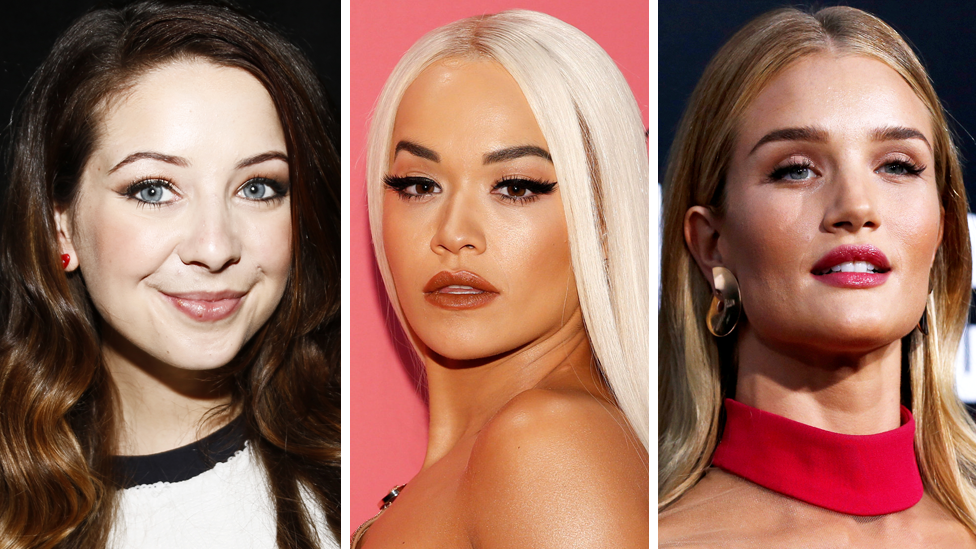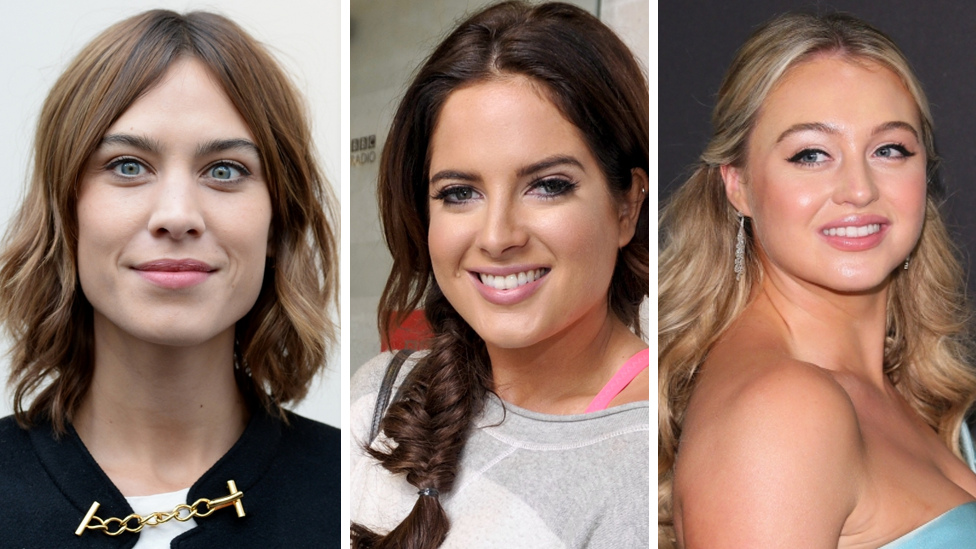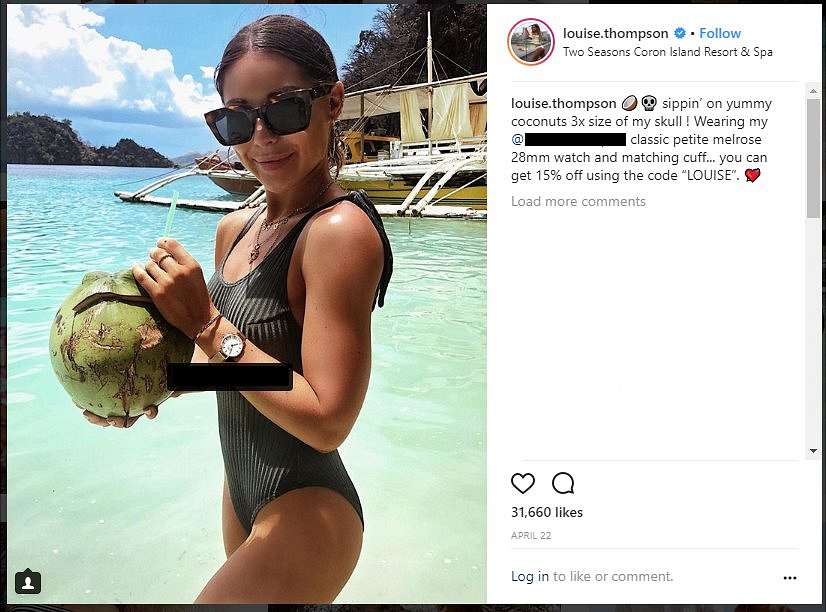Social media stars agree to declare when they post ads
- Published

Zoe Sugg (Zoella), singer Rita Ora and model Rosie Huntington-Whiteley are among those who have agreed changes
Sixteen social media stars including singers Ellie Goulding and Rita Ora, models Rosie Huntington-Whiteley and Alexa Chung, and vlogger Zoella have agreed to change how they post online.
They will have to clearly state if they have been paid or received any gifts or loans of products they endorse.
It follows warnings from the Competition and Markets Authority that their posts could break consumer law.
Online endorsements can boost brands but can also mislead, said the CMA.
The CMA has not made a finding on whether the influencers named breached consumer law, but said all of them volunteered to change their practices following an investigation.
However, if they fail to comply with the agreement reached with the CMA, they could be taken to court and face heavy fines or prison sentences of up to two years.

Actress Michelle Keegan, vlogger Jim Chapman and reality TV personality Chloe Sims were also named
The celebrities named by the CMA are:
Pop star Rita Ora
Actress Michelle Keegan
Singer Ellie Goulding
Writer and model Alexa Chung
Designer and model Rosie Huntington-Whiteley
Video blogger Zoe Sugg (who vlogs under the name Zoella)
Mario Falcone from The Only Way Is Essex
Alexandra 'Binky' Felstead from Made In Chelsea
Holly Hagan from Geordie Shore
Model Iskra Lawrence
Camilla 'Milly' Macintosh from Made In Chelsea
Reality TV personality Megan McKenna
Chloe Sims from The Only Way Is Essex
Louise Thompson from Made In Chelsea
Fashion video blogger James Chapman (who vlogs as Jim Chapman)
Fashion blogger Dina Torkia
Warning letters have been sent to a number of other unidentified celebrities, urging them to review their social media posts.

Analysis
by Chris Fox, technology reporter
Usually when celebrities post an advert without being clear they were paid to do so, it's the Advertising Standards Authority (ASA) that gives them a slap on the wrist - if a complaint is made.
But while the ASA takes action against individual advertisements or campaigns, the Competition and Markets Authority (CMA) can take action against people.

Alexa Chung, Binky Felstead and Iskra Lawrence were all named
Social media platforms including Instagram already have built-in tools, such as the paid-partnership tool, which make it clear that a post is an advertorial.
All 16 of the celebrities named by the CMA were being investigated because they may have broken the rules repeatedly.
By agreeing to change their ways they have avoided court action, which could have led to unlimited fines or even up to two years in jail.
Officially, no ruling was made on whether the stars broke the rules, because they were not taken to court this time.
But the CMA says its investigation is not finished. It has sent warning letters to more influencers, and is going to investigate the social networks too.

Andrea Coscelli, chief executive of the CMA, said: "Influencers can have a huge impact on what their fans decide to buy. People could, quite rightly, feel misled if what they thought was a recommendation from someone they admired turns out to be a marketing ploy.
"You should be able to tell as soon as you look at a post if there is some form of payment or reward involved, so you can decide whether something is really worth spending your hard-earned money on."

What are the rules?
influencers must clearly label content that has been paid-for or for which they have received gifts or loans. #ad or #sponsored are examples, and must now be prominently displayed at the beginning of the post, rather than buried away among other hashtags
even gifts that are made without a requirement to post about them afterwards must be declared if they appear in social media content. #freebie is suggested as a label
it is no longer enough for influencers to declare the companies they work for in their profile. Each post must be treated in isolation and all paid-content or commercial relationships declared
if an influencer is engaged in various commercial relationships related to an individual post, each one must be declared

But one lawyer told the BBC that the UK's rules were still complex.
"The CMA has portrayed these posts as if some celebrities are deliberately trying to pull the wool over the eyes of their fans, but often it is just that the various guidance is difficult to follow," said Geraint Lloyd-Taylor, legal director at law firm Lewis Silkin.
"I think the hashtag #ad will become the default, but it seems that the CMA intends to also look more at what the platforms are doing and it might be that we see more built-in tools and other changes from them as well."
The practice of endorsing products, from clothes to cars, hotels to holidays, is widespread among so-called social media influencers who can earn tens of thousands of pounds from companies for a single post on sites such as Instagram.
The risk is that consumers will place more trust in a product that has been recommended by someone they admire on social media.
Some celebrities do use hashtags such as #ad or #sponsored to indicate that they have been paid to post content.

The Advertising Standards Authority has previously flagged several of reality star Louise Thompson's posts as product endorsement
The CMA will be conducting further investigations into the role and responsibilities of social media platforms.
The Advertising Standards Authority launched its own investigation into advertising on social media following complaints about the practice and has flagged up content from reality TV star Louise Thompson about product endorsement on two occasions.
- Published16 August 2018

- Published22 January 2019
